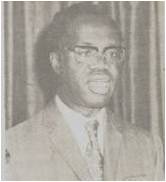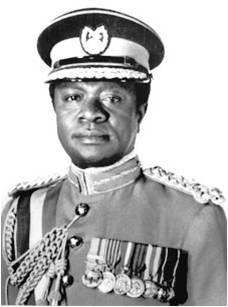The second Ghana coup,1972
The National Liberation Council
The National Liberation Council which was set up to rule Ghana after the overthrow of Nkrumah returned the country to civilian rule in three years. At this point we will consider the reasons why the military intervened a second time and overthrew the restored civilian government in 1972.
1. The 1969 elections were won by the Progress Party (PP) of Dr Kofi Busia, with 105 seats, against 29 seats for the National Alliance of Liberals (NAL), led by K.A. Gbedemah, a former finance minister of Nkrumah. Busia was sworn in as Prime Minister in September 1969. Busia's government started well and made great efforts to improve the living conditions of the people in the rural areas. Thirty-three water projects were completed and another 64 were under construction by 1972.

A Rural Electrification Scheme benefited 58 villages and small towns. Housing programmes, health clinics and feeder roads were expanded in the rural areas. Agricultural development schemes went ahead in the northern and central regions.
Unfortunately, the mistakes of the Busia government outweighed in the public eye the good it was doing in the countryside. Some ministers were corrupt and unable to resist that disease of post-independence politicians: the quest for aristocratic effect, the accumulation of big cars, real estate and other material symbols of power and status.
2. Ministerial corruption was to weigh large in the mind of the puritanical army officer Colonel Acheampong. Then there were Dr Busia's increasing dictatorial tendencies. Busia had been elected with a large majority partly because he personified the resistance of Ghanaian liberal intellectuals to the Nkrumah personality cult. But power has an effect on individual leaders, and regimes undergo significant changes in the hustle and bustle of competitive politics.
 DR. KOFFI BUSIA opposed
Nkrumah, he was put in prison
DR. KOFFI BUSIA opposed
Nkrumah, he was put in prison
Although Busia was an intellectual and a scholar, he became, under the strain of power and its temptations, less representative of the liberal values and prejudices of his own class in Ghanaian society than he seemed to be at the beginning. His arbitrary dismissal of an editor of a government-owned newspaper and his attempt to disband the trades union congress weakened respect for the Prime Minister and did Harm to the constitutional process that he was pledged to uphold.
3. An additional factor to be considered is the intensification of ethnicism and regionalism in Ghana's politics under Dr Busia. Although ethnic divisions in Ghana were less deep and perilous than those in, say, Nigeria and Uganda, such differences and cleavages were by no means absent from Ghanaian politics. The 1969 elections had reopened some of the old ethnic cleavages, and voting showed a striking response to ethnic factors. The Progress Party gathered its support from Akan-speaking areas, especially Ashanti, and also from northern Ghana.

COL. IGNITIOUS ACHEAPONG led a coup in Ghana in 1972. He was overthrown in another coup that brought in Jerry Rawlings in 1979
The platform of the party tried to be of national appeal. Nevertheless, the distribution of Busia's support included an unmistakable ethnic base, and Gbedemah's NAL became more ethnically conscious as the electioneering got under way, gathering support largely in Eweland. As Prime Minister, Busia showed ethnic preferences in key appointments. The soldiers who overthrew Busia in 1972 were able to claim that growing ethnicism was another of the national problems they had come to power to remove.
Busia's policy of 'dialogue' with South Africa was generally unpopular in Ghana. But it was his economic and financial policies which undermined his regime. A heavy fall in world cocoa prices in 1971 led to a severe economic crisis in Ghana. Busia's advisers and foreign creditors suggested a devaluation of the cedi by 20-25 per cent; but the Prime Minister unilaterally imposed a devaluation of 44 per cent (December 1971). The result was an immediate and dramatic increase in the cost of imported goods.
Earlier in the year, Busia had offended the army by cutting its budget by 10 per cent, as contribution towards solving the country's economic problems. The officers' vehicle allowance was abolished. Major exercises involving the use of ammunition and transport had to be cancelled. Thus Busia struck directly at the army's privileges and its efficiency. The soldiers were in no mood to accept suggested new roles in 'development', such as assisting civilians in anti-cholera and food-relief programmes and co-operating with the police against crime.
The 1972 Coup
On 13 January 1972 Colonel Ignatius Acheampong, commander of the First Infantry Brigade at Accra, took over the government in a bloodless coup and established a National Redemption Council of army officers to rule the country.
The first acts of the Acheampong regime reveal the motivation of the coup-makers. Civil servants' (including army officers') car allowances were restored, rents for official quarters were reduced, and the development levy of one per cent of a salary above a certain income level - introduced in the last Busia budget - was abolished. Busia called Acheampong's coup ‘an officers' amenities coup arising from their grievances at my efforts to save money'.
On the other hand, Acheampong revised the devaluation which helped to reduce the cost of imported goods; he won widespread support when he repudiated some foreign debts and secured a renegotiation of others; and he introduced programmes such as Operation Feed Yourself which brought down the cost of food. Perhaps it would be fair to conclude that Acheampong carried out a coup of rivalry for power, a militarily-inspired military coup, to protect army interests, but that once in power, he began to act in the national interest.
National Movements and New States in Africa